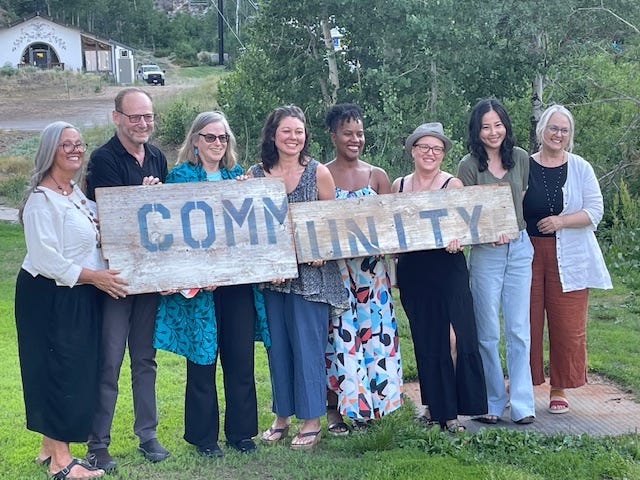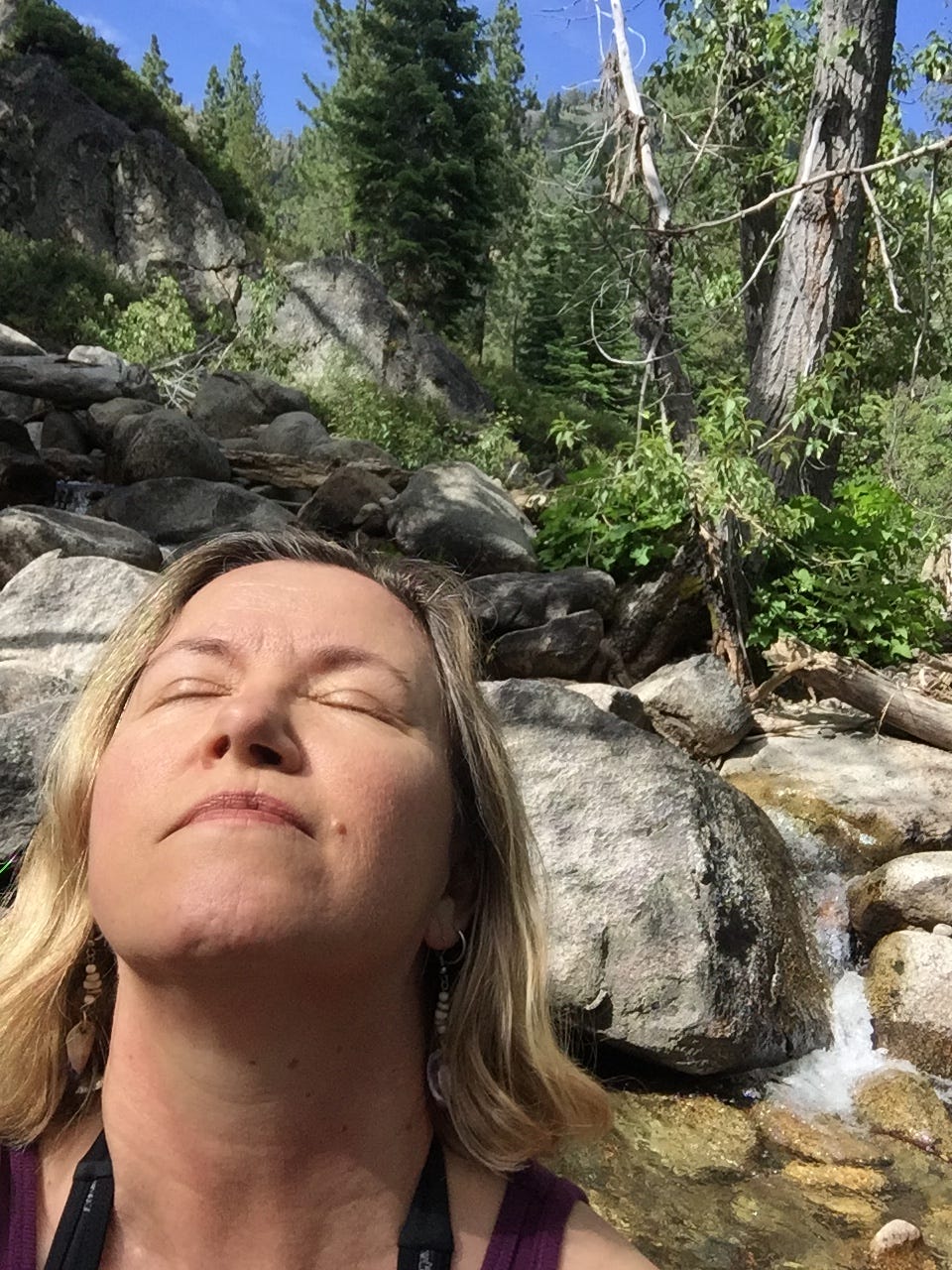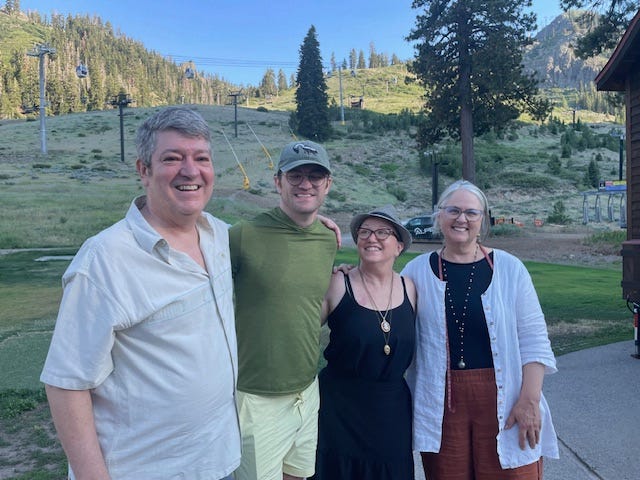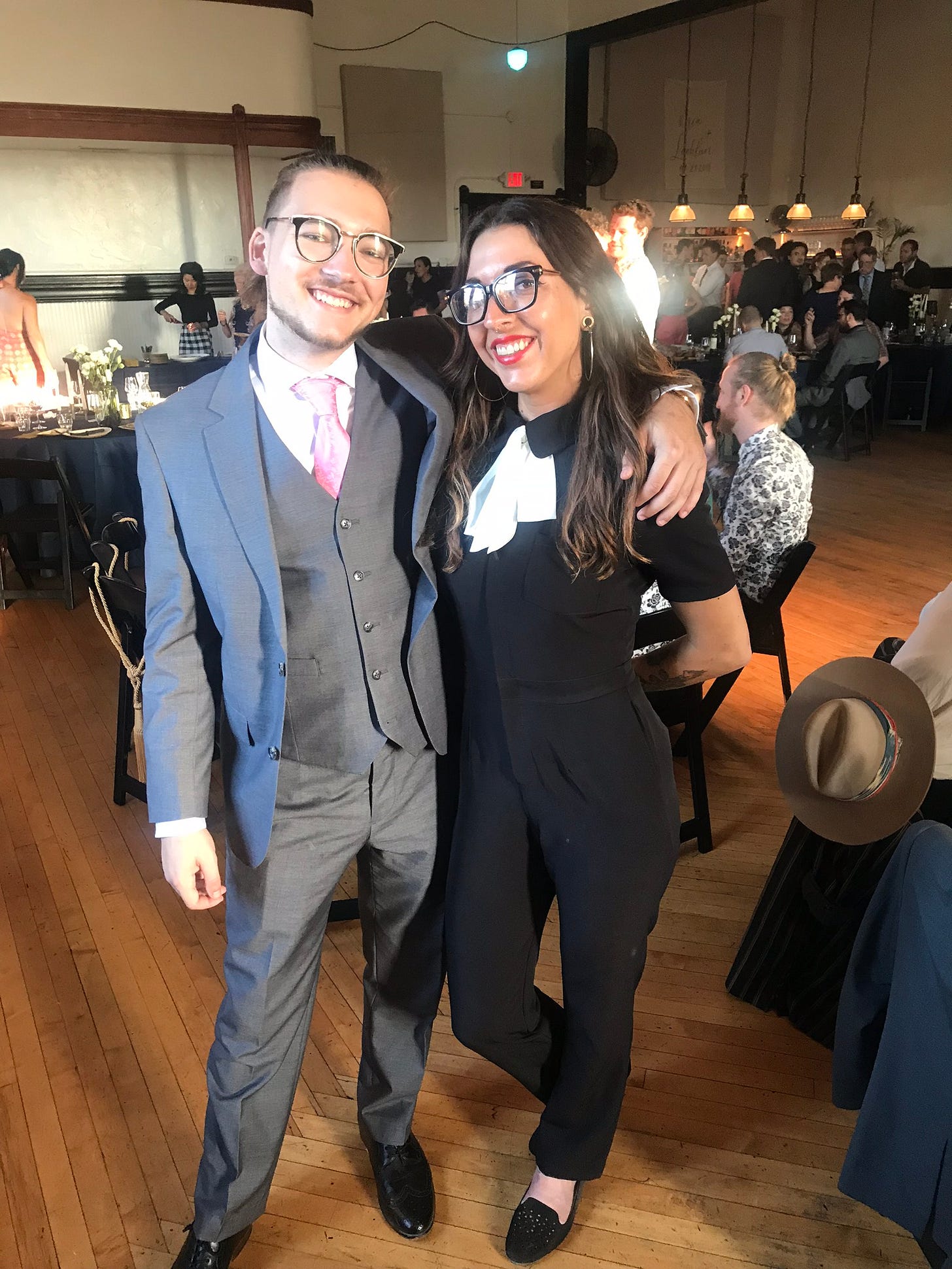The COW and the Lost Son
Reading at the Tahoe Olympic Valley and meeting our scholarship recipient
In July, I was invited to read from my work as an alumna of the Community of Writers, an annual competitive writing community formerly known by a Native American slur, for which the mountains were named. The area is now known as the Palisades, and the mountain is renamed Washeshu Peak. The writing program just went with Community of Writers, or COW, which is a little awkward but so much better than the slur. We deal with it, right? (Moo.)
I went to the COW twice, first arriving in 2016 on the strength of my as-yet-unpublished memoir, Wedlock, which is about my former marriage to a Catholic priest. I decided I no longer wanted to write/think about my ex and instead, wanted to write about my search for my adopted great-great-grandfather and his mother. I had found a way through the mystery of his adoption and saw how bereft his mother was. I thought nonfiction was an excellent way to tell this story. My creative nonfic group disagreed. So did my one-on-one mentor. They all told me, “This is a novel.” Tell it as a novel, they said. Tell her story. “Boys are so hungry!” How did she get by?
I was outraged.
Women can and do write serious history. Women can write more than novels. Women can write anything they put their minds to. I went home, still seething, wondering how I would write about Martha and her lost children. I kept reading, I started to sew a dress by hand, and that led me to Laci’s Museum of Textiles & Lace in Berkeley. I spoke to the curator of the museum about dressmaking and seamstresses back in 1850-1860, and she set me straight: If there was no work, she would end up selling her body. So much so, that the term seamstress became a synonym for prostitute. But there was always mourning to sew. Someone was always dying, and mourning-wear must be made.
I went home, and somehow these ideas began to bubble in my head. The boys were so hungry. She must have work! There was always some mourning-wear needed. And so Martha Lozier, the grieving widow, and her never-ending workload became A NOVEL!
I worked on the novel for two years and then I went back to the COW in July of 2018. This time, the leadership went NUTS over my work. Agents were excited, editors were verklempt. I got some good feedback and was told to finish it and send it in. I was told to expect robust sales.
I kept writing, and I started sending out my manuscript. But then in 2019, our world stopped. Our beloved, troubled son Austin took his own life. And I felt like someone had taken my brain and mashed it with a potato masher, froze my nervous system and removed my ability to speak complete sentences. I was an empty shell, taking the lead and trying my best to protect my husband and my daughters from any more bad news. I became a human bullet shield. I stopped writing.
Because who can write after that?
I didn’t take selfies for a very long time. I gained at least 20 pounds. I didn’t leave the couch. We sank into the cushions, ate garbage and watched every episode of Law and Order, in order. At some point, we decided we needed to move away, because that house just felt sad. We found a fixer-upper in the mountains and started to work in early 2020. We pounded nails for a year. A pandemic swept America and my mother-in-law died, and none of it hurt because we had already had the worst thing happen. The house became livable. We moved in. Late in 2020 I wrote a piece for the Sunday SF Chronicle about our journey. I won an award for that from the press club. But, better, I had found the ability to write again. In 2021 I started rewriting and completely revised the “Widow’s Weeds” book I had been writing, calling it The Bereaved.
And this time, I truly knew what a bereaved mother was.
I also began donating money to the COW, a scholarship fund we called The Austin Tracey Memorial Scholarship. Whenever they had a call for funds, I sent some money. It wasn’t a lot, but it was what I could do for him, and for the place that helped me write my story.
This year, I was invited back to the COW to read from my award-winning published work, The Bereaved. I arrived that Thursday evening with other alums Ilana DeBare, Rita Chang-Eppig, Jessie Ren Marshall, and Reid Sherline. (See photo below.) I gave essentially the speech of everything I said above, how I was unable to write, and then suddenly I could write, and I told the assembled writers,
“If I can write again after losing our son to suicide, you can keep writing. You can finish your book.” Then I said, “And if I can keep writing after breast cancer” (here I removed my hat so you could see my shorn head), “you can keep on writing.”
They seemed to appreciate that.

But that wasn’t all. When we arrived, I asked if anyone had recently received the Austin Tracey Memorial Scholarship, and Brett Hall-Jones told me, yes, and in fact, he’s here tonight…. So we got to meet Dan O’Leary, a bright, lovely writer who used our funds to further his writing career. We were so delighted and proud and weepy.
Because, coincidentally, Dan also looks kind of like Austin (compare them). We were a soggy mess. Look at how I am ogling the poor kid.
So we were in tears and we left right after the reading and went directly to a bar and had a stiff drink. That’s it. We melted under pressure.
But I think we were forgiven. As it turns out, Dan texted me and asked if he could stop by on his way home that Saturday, and he turned up with a bagful of bakery cookies. He got a house tour and a soft drink, heard our stories and told us about his work, and we feel like we adopted him.
Is there a lesson here? Er. Hmm. How about this:
Don’t give up because all of your hardships will make you a better writer, and also, there are angels out there. Miracles happen. Love is in the air.
We miss you, Austin.









And now I'm a little bit weepy on a Saturday afternoon 🥲
Lordy, I’m in tears. What a beautiful ending.